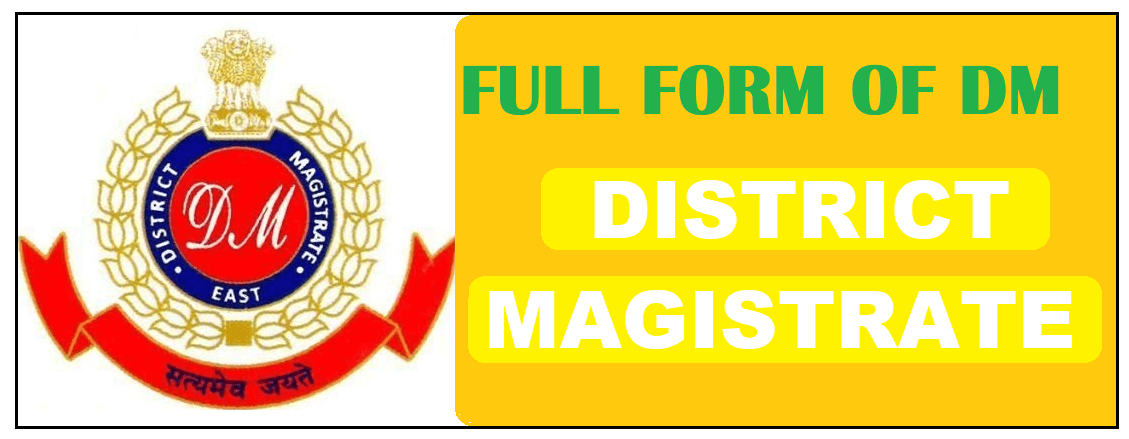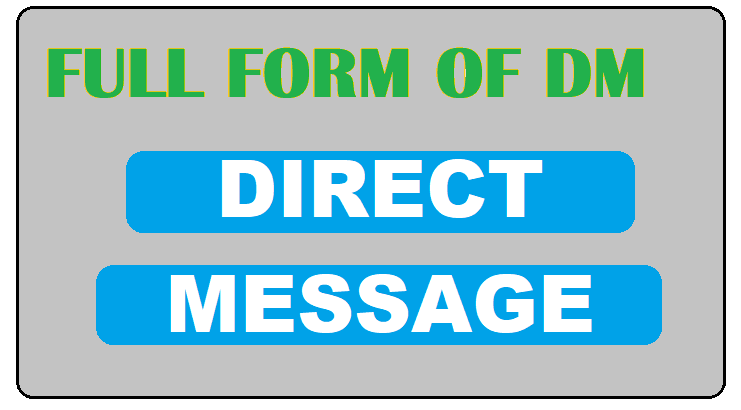Full form of DM
Full form of DM
This tutorial will briefly cover about the various full forms of DM, i.e., District Magistrate, Direct Message, Discrete Mathematics, including their definition, history, functions, overviews, vision and other detailed information.
(i) DM: District Magistrate
DM is among the most respectable government job posts. But do you know its full form?
The abbreviation DM stands for District Magistrate.

Who is a District Magistrate?
“DM or District Magistrate is a district head (or a government official) responsible for administering the bureaucracy and proper functioning of law and order in a district of India. They are also called District Collector or Deputy Commissioner in various states of India.”
DM is accountable for protecting law and order within the district and has the authority to take any necessary action under the criminal procedure code. The DM's judicial function and responsibility have been reduced firmly due to the division of power between India's executive and judiciary departments.
India has roughly 718 districts, and each of them is allocated with one District Magistrate or District Collector. However, several executive magistrates or officers assist them at the headquarters and manage lower administration levels like tehsils, subdivisions, and blocks. District Magistrate is a member of the IAS (Indian Administrative Service), and the Union Public Service Commission recruits them. DM officers or Collectors are posted from one district to another from time to time by the Indian state government, amidst the provisions of IAS (Indian Administrative Service) officials, who posted mostly on Level 11, Level 12 or Level 13 of the Pay Matrix in the state.
History of DM
DM or District Magistrate is a contribution of the British Raj. At that time, District collectors were the Indian Civil Service members and were in charge of supervising the administration of the concerned state. Later, in 1772 Warren Hastings introduced a personal office for the District collector.
With time, India started conducting entrance examinations to select ICS (Indian Civil Service) officers. Later the first three ICS officers- Romesh Chandra Dutt, Anandaram Baruah, and Sripad Babaji Thakur, became the first District Collectors.
The district proceeded to be part of the administration even after India's independence after 1947. Later, in 1972 the Nehru Government introduced the National Extension Services and Community Development Programme. With that program, the district collector was consigned to implement the Government of India's development programs in the district.
Roles and Responsibilities

The roles and functionalities allocated to a district magistrate may vary from state to state. However, district collectors are responsible for managing and fulfilling a wide range of responsibilities, including the following:
As District Magistrate:
- District Magistrate is responsible for conducting criminal court sessions of its executive magistrate.
- They look after the law and order of the concerned state while coordinating with the police officers.
- He/She supervises its subordinate executive magistracy and administers authoritative inquiries and interrogations.
- They are responsible for the regular inspection and monitoring of police stations, jails and juvenile shelters located in the region.
- Sanctioning the various parole orders to the district prisoners.
- Imparting firearms and ammunition licenses to different authorities as mentioned under the Arms Act.
- They are responsible for providing disaster management support if any natural calamities (unlike earthquakes, floods, famines or epidemics) occur in the district.
- District Magistrate is responsible for crisis management if riots or external aggression are happening in the state.
- They supervise child labor or bonded labor-related matters.
- They prepare a panel of names for public prosecutors and additional public prosecutors with a discussion with a district's concourse judge.
As District Collector:
- District Collectors are responsible for conducting a revenue court.
- They are the arbitrator of land procurement, its estimation and accumulation of land revenue.
- They are in charge of collecting income tax dues, excise services, irrigation taxes, and arrears.
- They provide relief and rehabilitation support.
- Collectors are responsible for the inspection of several district workplaces, sub divisions and tehsils.
- They manage the registration of Property documents, sale agreements, power of attorneys, impairment, etc.
- They issue several sorts of legal certificates, including Birth, Domicile, OBC, SC/ST & EWC, Nationality, Marriage, etc.
Frequently Asked Questions/FAQ’s
Question 1: What is the name of the first District Magistrate of India?
Answer: The name of the first District Magistrate of India is Romesh Chandra Dutt.
Question 2: Does the DM have the statutory rights to suspend a police officer?
Answer: A district collector doesn't uphold any right to suspend any police officer, not even a constable, if the district's police commander (SP/SSP) doesn’t allow it. A DM/DC has only the right to suspend any department's officers belonging to class 3 officers but not a Police officer.
(ii) DM: Direct Message
Another full form of the abbreviation DM is Direct Message.

What does Direct Message means?
“DM or Direct Message is an interesting social media short form that allows the sending and receiving the private messages between users using any social network.”
(ii) DM: Discrete Mathematics
The third full form of the abbreviation DM is Discrete Mathematics.

What is Discrete Mathematics?
“DM or Discrete Mathematics is the study of mathematical formations that are mostly discrete rather than being continuous.”
Discrete Mathematics is essentially important to learn subjects such as compiler design, databases, computer security, operating system and automata theory, etc. It is frequently practiced in the functional areas of mathematics and computer science. It is a very beneficial medium for developing logical thinking and problem-solving skills.